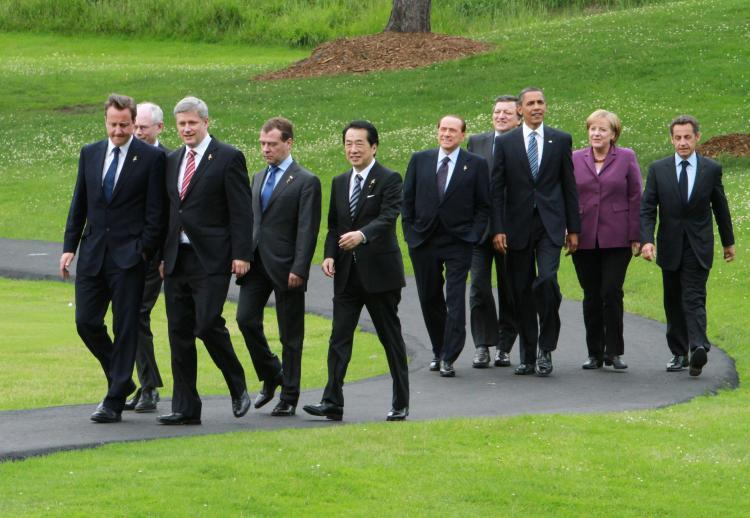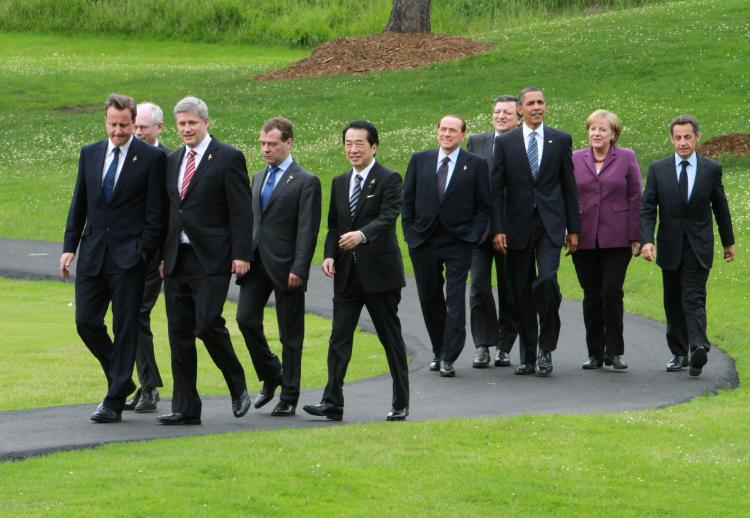TORONTO—G8 leaders issued a grab-bag communiqué of goals and concerns after meeting in Ontario cottage country Friday and Saturday.
Besides reiterating support for past initiatives and international agreements, they announced the expected initiative on maternal health.
Titled the Muskoka Initiative, the plan pledges the G8 countries to mobilize $5 billion of additional funding over five years on top of the $4.1 billion they already contribute annually to international development assistance for maternal and under-five child care.
That money will also be combined with the $2.3 billion pledged from U.N. Foundations and the Bill and Melinda Gates Foundation.
The World Health Organization and World Bank estimate the initiative will help developing countries prevent 1.3 million deaths of children under five, 64,000 maternal deaths, and help 12 million couples with family planning.
The G8 leaders also raised several other concerns. North Korea’s pursuit of nuclear weapons and its attack on a South Korea military vessel were targeted, as were Burma’s military junta, Iran’s shadowy pursuit of nuclear capacity, and the ongoing strife in the Democratic Republic of Congo.
They endorsed the Kimberley Process, an international process which certifies that diamonds have not been extracted to fuel bloody conflicts, as a way to curb financing related to Congo’s conflict.
Climate change got a mention as well; the leaders reiterated their willingness to share a goal with all countries to reduce global emissions by 50% by 2050, and build “low-carbon and carbon-resilient economies, characterized by green growth and improved resource efficiency.”
The G8 also noted the failure of the international community to meet its 2010 target to significantly slow the loss of biodiversity. “We recognize that the current rate of loss is a serious threat, since biologically diverse and resilient ecosystems are critical to human well being, sustainable development and poverty eradication,” stated the communiqué.
In addition, international peace and security figured prominently among the G8 priorities. The leaders repeated their ongoing concern with threats to global peace and security, including proliferation of weapons of mass destruction, terrorism, international organized crime, piracy, and political/ethnic conflict.
“We share a vision of a peaceful world, based on the principles of freedom, democracy, respect for human rights and the rule of law, and remain ready to continue to work on this basis in partnership with each other and other concerned countries to address security challenges that affect us all.”
Besides the Muskoka Initiative, world leaders also set specific plans in place to start three initiatives to strengthen civilian security systems that are meant to stabilize fragile regions.
“These initiatives will aim to reduce the intensity of conflict-related instability, protect civilians in situations of armed conflict, counter terrorism, combat piracy and transnational crime and help establish an enabling environment for growth, investment and democratic development.”
One initiative plans for civilian reinforcements to build capacity for security, governance, and the rule of law. These reinforcements will work with military forces to help rebuild regions damaged by conflict and help ensure stability and security.
A second initiative aims to help coastal states with maritime security capacity so they can better patrol and govern their waters for piracy and fisheries.
The third initiative will see G8 countries help build up international police peace operations by mentoring and training police for duty on United Nations and African Union peace operations.
With the G8 now concluded, world leaders will focus their attention on the G20 Summit now kicking off in Toronto where the global economic recovery will take centre stage.
Besides reiterating support for past initiatives and international agreements, they announced the expected initiative on maternal health.
Titled the Muskoka Initiative, the plan pledges the G8 countries to mobilize $5 billion of additional funding over five years on top of the $4.1 billion they already contribute annually to international development assistance for maternal and under-five child care.
That money will also be combined with the $2.3 billion pledged from U.N. Foundations and the Bill and Melinda Gates Foundation.
The World Health Organization and World Bank estimate the initiative will help developing countries prevent 1.3 million deaths of children under five, 64,000 maternal deaths, and help 12 million couples with family planning.
The G8 leaders also raised several other concerns. North Korea’s pursuit of nuclear weapons and its attack on a South Korea military vessel were targeted, as were Burma’s military junta, Iran’s shadowy pursuit of nuclear capacity, and the ongoing strife in the Democratic Republic of Congo.
They endorsed the Kimberley Process, an international process which certifies that diamonds have not been extracted to fuel bloody conflicts, as a way to curb financing related to Congo’s conflict.
Climate change got a mention as well; the leaders reiterated their willingness to share a goal with all countries to reduce global emissions by 50% by 2050, and build “low-carbon and carbon-resilient economies, characterized by green growth and improved resource efficiency.”
The G8 also noted the failure of the international community to meet its 2010 target to significantly slow the loss of biodiversity. “We recognize that the current rate of loss is a serious threat, since biologically diverse and resilient ecosystems are critical to human well being, sustainable development and poverty eradication,” stated the communiqué.
In addition, international peace and security figured prominently among the G8 priorities. The leaders repeated their ongoing concern with threats to global peace and security, including proliferation of weapons of mass destruction, terrorism, international organized crime, piracy, and political/ethnic conflict.
“We share a vision of a peaceful world, based on the principles of freedom, democracy, respect for human rights and the rule of law, and remain ready to continue to work on this basis in partnership with each other and other concerned countries to address security challenges that affect us all.”
Besides the Muskoka Initiative, world leaders also set specific plans in place to start three initiatives to strengthen civilian security systems that are meant to stabilize fragile regions.
“These initiatives will aim to reduce the intensity of conflict-related instability, protect civilians in situations of armed conflict, counter terrorism, combat piracy and transnational crime and help establish an enabling environment for growth, investment and democratic development.”
One initiative plans for civilian reinforcements to build capacity for security, governance, and the rule of law. These reinforcements will work with military forces to help rebuild regions damaged by conflict and help ensure stability and security.
A second initiative aims to help coastal states with maritime security capacity so they can better patrol and govern their waters for piracy and fisheries.
The third initiative will see G8 countries help build up international police peace operations by mentoring and training police for duty on United Nations and African Union peace operations.
With the G8 now concluded, world leaders will focus their attention on the G20 Summit now kicking off in Toronto where the global economic recovery will take centre stage.






